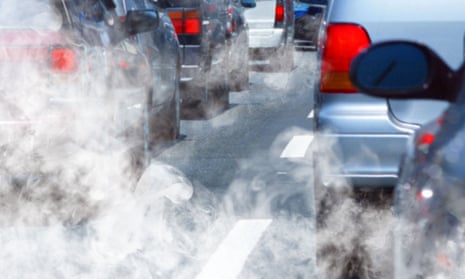The UK is pushing for a weakening of air pollution limits and a delay to their introduction in response to lobbying from the motor industry, documents reveal.
In revelations that will raise questions over the British government’s commitment to the climate change deal agreed in Paris at the weekend, papers obtained by ClientEarth, a firm of environmental legal experts, and seen by the Guardian, showed the UK had pushed for limits on pollution to be relaxed.
The government’s papers called for carmakers to be allowed to far exceed the nitrogen oxides (NOx) limit of 80mg/km until 2021, and to be allowed to go 40% over the current limit after that.
The revelation comesbefore a meeting of the European parliament’s environment committee on Monday evening, which is expected to voice strong objection to the decision to water down emissions limits.
Alan Andrews, a lawyer for ClientEarth, said: “The decision to water down vehicle emission standards was a political stitch-up by the commission and an unelected committee of technocrats that will force us all to breathe illegal levels of air pollution for years to come. These rules are illegal and should be vetoed by the European parliament. If they fail to, the British government should take legal action to strike them down.
The Department for the Environment and Rural Affairs (Defra) has accepted that more than 50,000 people a year die prematurely as a result of air pollution in the UK. The figure includes about 29,000 deaths hastened by inhaling minute particles of oily, unburnt soot emitted by all petrol engines and an estimated 23,500 by the invisible but toxic gas NOx emitted by diesel engines.
According to ClientEarth, the British government’s position in October showed that despite the VW scandal, it was more concerned about protecting the motor industry than Britons’ health. Volkswagen has been engulfed in a scandal after it emerged that some of its diesel cars had been fitted with devices that could detect when they were being tested, concealing the real level of pollutants being emitted when on the road.
This is not the first time the government’s commitment to reducing air pollution has been called into question. In September, it emerged that Defra lobbied against part of a proposed EU directive that would force member states to establish national testing regimes to catch out those who tried to conceal the damage they were doing.
The proposed legislation – the national emissions ceiling directive – is designed to “ensure that policies and measures are effective in delivering emission reductions under real operating conditions”, according to the European commission.
In April, the supreme court ordered the government to make plans for tackling the UK’s air pollution problem, which has been in breach of EU limits for years. The five judges unanimously ruled in favour of a legal challenge by ClientEarth and said the next environment secretary must draw up a plan to meet the EU rules by the end of 2015.
In October, the European commission controversially backed a relatively weak air pollution limit. Member states focused on the introduction of “real driving emissions tests” to bring closer the implementation of the EU limit of 80mg/km of NOx.
The new tests are intended to better reflect actual emissions during on-road driving. Because of uncertainty over the tests, however, carmakers lobbied for a generous margin of error, what is known as the conformity factor.
Most EU members – apart from Belgium, Denmark, Ireland and the Netherlands – also favoured weaker new tests. The UK said before the October decision: “On the limited evidence we have seen, we currently do not see a rationale for agreeing a conformity factor less than the 2.2 upper limit of the commission’s stated range.”
In other words, the UK wants carmakers to be allowed to far exceed EU NOx limit until 2021. After that, Defra wants a conformity factor of 1.4, or 40%.
“It is also our judgement that the conformity factor should be set at a realistic and achievable limit for the industry, recognising that diesel is an inherent part of many manufacturers planning to deliver their CO2 obligations to to 2020,” said the position paper.
By voting to weaken rules on diesel vehicles, the government will undermine efforts to introduce an ultra low emission zone (Ulez) for London, say campaigners. Under the scheme, vehicles face an additional charge on entering the congestion charging zone unless they meet the EU NOx limit. However, if the EU regulations are watered down the Ulez will fail to deliver clean air for London.
A government spokesperson said: “The UK government is committed to taking action on emissions testing and we see real world testing (RDE) as the ultimate solution and a vital step in tackling air pollution. The vote to introduce RDE in 2017 is an important milestone but we will continue to press for a comprehensive approach at an EU level on emissions testing that restores consumer confidence and delivers our wider air quality and climate objectives.”
